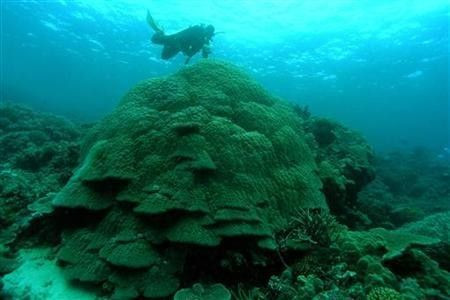Australia’s Coal Industry Is Potential Threat To Great Barrier Reef

The planned Galilee Basin coal mines and the Abbot Point coal port expansion in Australia, which will be rising near the Great Barrier Reef, is feared by environmentalists to cause the degradation of the UNESCO’s World Heritage site. The plans are at odds with Australia’s commitment to cut greenhouse emission by five percent by 2020. The nation is also aware that climate change is an issue to the health of the reef.
“If Australia is truly committed to preserving the Great Barrier Reef, it faces a tough choice: re-examine the current plans for unrestricted coal exports, taking proper account and responsibility for the resulting greenhouse emissions, or watch the reef die. Surely we as Australians have more foresight and chutzpah than to let that happen,” the Conversation article opined.
As it is, climate change is indeed happening, rising temperatures will impact agriculture and the increase in the temperature in the sea will impact migration patterns of sea population affecting catch. Increase in ocean acidification will affect the coral health system, threatening Australia’s tourism industry.
Environmentalists noted that coal shipping, port dredging and climate change, exacerbated by coal mining, are contributing an even greater damage to the reef. “The spectre of coal ships traversing the Great Barrier Reef couldn’t be more laden with symbolism. Coal extracted from the Queensland landscape, if burned along with other fossil fuel reserves, will ensure the destruction of the Great Barrier Reef,” the report said.
“With only 500-800 gigatonnes of carbon dioxide left in the global carbon budget beyond which we will push the climate into a dangerous state, the emissions from even a single mine can play a significant role,” Conservation added.
Despite the opposition to the expansion of the coal industry in Australia, The Minerals Council of Australia is stating that it makes up a significant percentage of the country’s GDP, bringing about $60 billion revenues. Movements are also being made against the coalmines in Australia but investments in fossil fuel projects are not about to stop.
The CEO of Australian Bankers Association, Steven Munchenberg, was quoted by an Australian Broadcasting Corporation, or ABC, article that fossil fuel is still an integral part of Australia’s economy. "Equally we see that fossil fuels remain a critical part of the Australian economy. A lot of people's jobs rely on fossil fuels, Australia's export earnings still rely heavily on those so there are big challenges there that need to be addressed,” Munchenberg said.
However fossil fuels must just lose the battle with renewable energy with more countries shifting to cleaner energy to avoid the impacts of climate change. According to the International Energy Agency, solar can dominate the electricity market by 2050. Solar as a renewable energy option, is expanding and this will also spill over to global titanium dioxide needs.
According to a separate research, titanium dioxide has photocatalytic properties which are quite effective in solar panel applications. There are other cleaner, environmentally friendly elements that can be mined.
White Mountain Titanium (OTCQB:WMTM) is contributing to the switch in clean energy. White Mountain Titanium operates the Cerro Blanco mine in Santiago, Chile and is aiming to become a leading titanium dioxide source worldwide.
To contact the writer, email: vittoriohernandez@yahoo.com





















